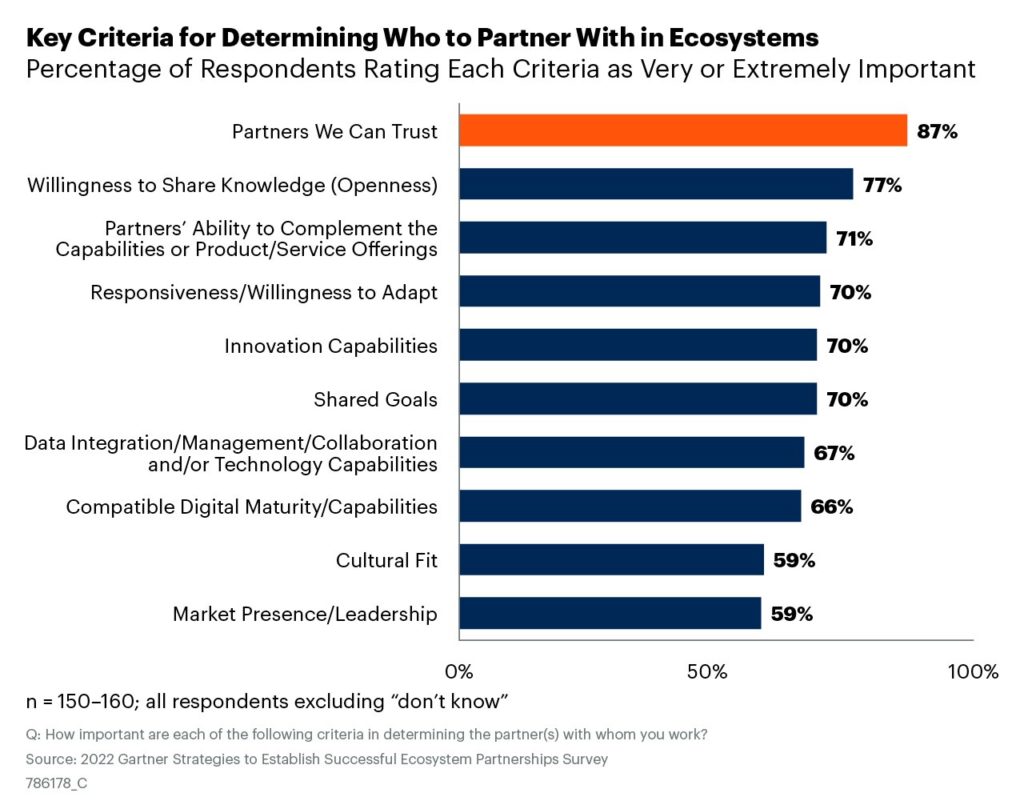Over the past seven months, I’ve been immersed in Gartner’s latest research into ecosystems, surveying more than 300 people, interpreting the results and conducting many in-depth interviews with leading ecosystem practitioners. And now, we’re sharing the insights in our latest Supply Chain Executive Report: Realizing the True Potential of Ecosystem Partnerships (subscription required).
What are the big takeaways?
First, supply chain leaders understand that ecosystems add value. Eighty-six per cent of enterprises involved in ecosystems responded that those partnerships were “very valuable” or “extremely valuable” in achieving their organisation’s stated objective for that partnership.
Second, shifting mindset is key. One of the key roles of a chief supply chain officer (CSCO) is to build trust in ecosystems by fostering new data-sharing mindsets, new partnering mindsets and, most importantly, helping people recognise the difference between networks and ecosystems. Moving from an independent one-to-many network view of the world to an interconnected many-to-many ecosystem view is critical to realising the true potential of ecosystems.
We are all interconnected
Imagine rain falling onto water. We could view the first drop as an independent event with perfect concentric circles rippling out from the centre, like those from your enterprise out to your network. But as we widen our perspective, we see each drop’s circles intersect with others.
Your competitors have their own networks, but their partners — suppliers, customers, and service providers — are also your partners. So, whether we realise it or not, we are already operating in interconnected ecosystems.
For CSCOs, recognising the interconnectedness of their partners is the key to ecosystem enlightenment, because succeeding in ecosystems requires conscious engagement. To borrow from Buddhist teachings, to find that enlightenment you must find your centre and find your truth.
Finding your centre
Find your centre by choosing the model that best works to deliver the ecosystem’s key goals:
- Enterprise-centric ecosystems have the enterprise at the centre, but now recognise partner interconnectedness and focus orchestration by setting standards and defining goals.
- Platform-centric ecosystems add a technology platform or trade body to overcome wariness around data sharing among members.
- Purpose-centric ecosystems have a shared purpose that provides the unifying centre of gravity that guides all partners in a common cause.
Finding Your Truth
All ecosystems depend on trust. Trust is the key to unlocking the sharing of resources and, most especially, data. It creates the foundation upon which you can build as you address challenges and opportunities together.
Our research showed that the level of trust that can be created and sustained between partners is the single highest correlation to the level of value that can come from all three ecosystem models described above.
We asked organisations to rate several criteria to show which were the most important in determining with whom to work and for those with many partners “Partners we can trust” was the No. 1 response with 87% stating it was very or extremely important.

Partners should establish a set of behavioural principles specifically aimed at building trust that will sustain the ecosystem over time. Trust improves the functioning of ecosystems, by providing the essential binding to focus actions on a strong unifying purpose.

Yone Dewberry, the CSCO of Land O’Lakes, one of the companies we interviewed in our research, has a simple equation for trust: “Trust equals truth over time.”
This equation helps his enterprise elevate the scope of the ecosystems beyond individual partner goals and, instead, build a sense of collective ownership and alignment among otherwise independent entities. For Land O’Lakes, the process led to shared outcome statements for farmers, retailers, food companies and technology providers to unite behind.
Trust drives up the level of value that an ecosystem can generate. It can also reduce risks, such as the likelihood of failure of technology initiatives. In our survey:
- Those with low trust were three times more likely to state that their multi-enterprise collaboration platform initiatives had failed to meet their objectives.
- Those with high trust were 40% more likely to state that their ecosystem was extremely valuable.
- Those with high trust were also 37% more likely to be exchanging data of all types, especially supply chain network data and customer data.
Trust is also needed to overcome the survey’s top-ranked external barrier to ecosystem success — “wariness about data sharing and data privacy.”
We call the mindset shift required the positive-sum mindset. A positive-sum mindset focuses on ecosystem partnership success by embracing the opportunities that come from sharing data and resources through equitable value sharing.
It differs from a competitive mindset which, in an ecosystem, will limit opportunities and drive overreliance on internal expertise, create aversion to sharing critical information that could help the ecosystem thrive and overemphasise local optimisation.
A positive-sum mindset promotes partnership and is aimed at ensuring the success of all ecosystem partners to realise the true potential of ecosystem partnerships.
First published on Gartner Blog Network




